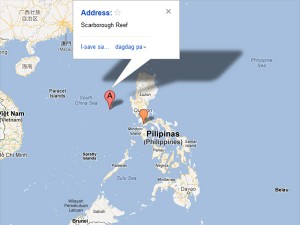China ropes off Scarborough Shoal
To cut or not to cut?
Chinese fishing vessels left Panatag Shoal (Scarborough Shoal) in the West Philippine Sea (South China Sea) but they roped off the mouth of its lagoon to prevent other fishermen from getting in, Defense Secretary Voltaire Gazmin said Thursday.
Speaking at a news conference, Gazmin said the Coast Guard had reported to him that the Chinese left a long rope held by buoys at both ends of the entrance to the lagoon of the horseshoe-shaped reef.
Gazmin said the defense department was studying what steps to take about the rope.
Stormy weather in the West Philippine Sea has prevented Philippine vessels from going to the shoal in recent days.
“It might be meant to prevent us from getting in because they are claiming [the shoal], but, of course, we are also claiming that it is ours,” Gazmin said.
Keep talking
In spite of the dispute, Gazmin said he and Chinese Defense Minister Liang Guanglie agreed to “keep the lines of communications open” when they met in Cambodia recently.
“We need to talk to secure a solution,” Gazmin said. “Our talks will continue.”
The Philippines and Vietnam are pushing a code of conduct in the West Philippine Sea through the Association of Southeast Asian Nations (Asean).
A code of conduct would prevent the rival territorial claims of Brunei, China, Malaysia, the Philippines, Vietnam and Taiwan in the West Philippine Sea from deteriorating into armed clashes.
Without a code of conduct, any of the claimants could not explore for resources in the disputed waters, Malacañang said Thursday.
Communications Secretary Ricky Carandang said it would be difficult for any country to go into the area without a code of conduct that spelled out the “ground rules” for any exploratory activity by any of the claimants.
“While we may be open to some way of jointly exploring those areas and jointly exploiting those areas, I think the first thing that needs to be done is we need to have a binding code of conduct,” Carandang said at a briefing for reporters. “So [joint exploration] remains an aspiration until certain agreements can be reached with other claimant countries.”
Carandang said diplomats and legal experts could figure a way out for a joint exploration, but this would fail without a code of conduct.
China and the Asean countries, however, have signed the Declaration of Conduct in the South China Sea to deal with the territorial disputes peacefully.
Carandang appealed to China and all the other claimants to observe the declaration so as to prevent an increase in tensions in the West Philippine Sea.
Panatag standoff
Chinese poaching at Panatag Shoal provoked a maritime standoff between the Philippines and China from early April to mid-June.
Last month, 20 of 30 Chinese fishing vessels in an expedition to the Spratly Islands traveled close to Philippine-occupied Pag-asa Island, drawing a warning from Manila not to come any closer.
Without hardware to defend its borders against Chinese intrusions, the Philippines has threatened to take the dispute to the International Tribunal for the Law of the Sea.
China, however, rejects international arbitration, insisting on its policy of dealing with its rivals for territory in the West Philippine Sea in one-on-one talks.
When?
Beijing has said it is open to discussions of a code of conduct with the Asean countries. But Carandang said China had shown no sign it would soon sit down with the other claimants to draft the code.
“We expect them to continue to participate in these discussions,” Carandang said. “[But] whether they are going to participate in the next high-level discussion is a question mark.”
Carandang said the Philippines would provide shelter for fishermen who would be stranded in the country’s territory in the West Philippine Sea despite the tensions there.
“In general, for humanitarian reasons, if fishermen were in trouble and we were in a position to help them and save their lives, we would, whether they be Filipino, Vietnamese or Chinese.” Carandang said.
For comprehensive coverage, in-depth analysis, visit our special page for West Philippine Sea updates. Stay informed with articles, videos, and expert opinions.
